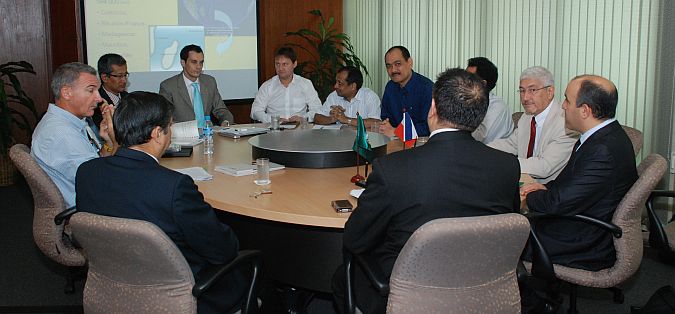
Prof. Mohamed Rochdi (left) and Prof. Said Irandoust.
on similar issues.Cooperation with universities within the Indian Ocean region is a high priority for the University of Reunion, Prof. Rochdi said, as he cited the university’s current linkages with universities in South Africa, Australia and India. He said that partnership with a highly international institute like AIT located in Thailand was a very attractive and strategic development.The university located in the French territory of La Réunion is both a French and European university. Established in 1982 as a full-fledged university, the University of Reunion has 17 research laboratories and conducts applied research with many French national entities, such as CIRAD.
President Rochdi informed that the University of Reunion offers 54 Master degree programs and has a strong research and network focus under the thematic areas titled: Global Change and Ecosystems Monitoring; Indian Ocean Societies; and Environment, Biodiversity and Health. The university currently has 400 research and teaching faculty, 120 teaching faculty, and 300 graduate students.
On the same day, AIT worked to finalize a Memorandum of Agreement (MoA) for dual degree PhD programs with CIRAD La Réunion. Meeting with the AIT President, AIT senior officials and faculty members, Dr. Giles Mandret, Regional Director of CIRAD La Réunion enumerated on the benefits of a dual degree PhD with CIRAD.
“We have high quality labs and facilities to pursue tropics-related research work,” he said. “Our degrees are also recognized in Europe and are completely accredited and evaluated.”
He said the island territory specialist research center with 55 researchers has linkages in South Africa, Mozambique, Zimbabwe, Kenya, Madagascar, Mauritius, Seychelles, India and China. Joining this network, AIT becomes an important partner because it is a regional institute comprised of many tropical countries in Asia, Dr. Mandret indicated.
He explained that CIRAD La Réunion’s mandate from France is to work in tropical environments, and to address southern issues associated with climate change. Its four research areas are: Ecological Intensification and Biodiversity; Food Security and Quality of Agriculture and Tropical Food Production; Emerging Infectious Diseases; and Environmental Risk, Agriculture and Integrated Management of Resources.
“This arrangement opens the way for students to gain a good perspective to Asia, and to move beyond mainland France,” he said. He added that it would be good for AIT to be associated with a European PhD degree concerning research on issues of key relevance to Asian countries located in the tropics.

